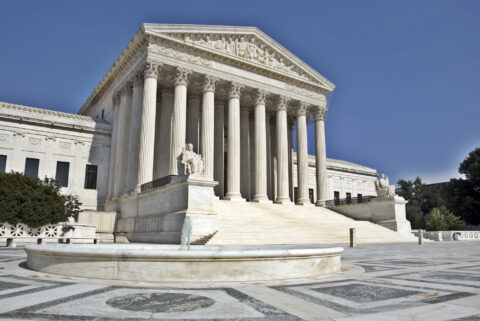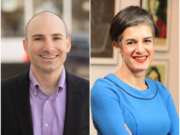All too frequently, regulation is a scale that balances the arbitrary against the vague. Decreasing one tips the scale towards the other. Under our campaign finance laws, for example, a contribution of $2,100 is wholesome but a contribution of $2,101 is corrupting. No one really believes this, but arbitrariness is the price we pay for clarity.
Just as often, the scales of regulation are tipped in the other direction. Regulators will draw a line that attempts to be principled rather than arbitrary. The result is usually a regulation that is unworkably vague. One example is the line drawn by the tax code between politics and religion.
While they are allowed to engage in issue advocacy, tax-exempt churches, like all 501(c)(3) organizations, are prohibited from “participating in, or intervening in, any political campaign on behalf of (or in opposition to) any candidate for elective public office.” Churches that violate this restriction risk lengthy investigations, the loss of their tax exempt status, and fines.
But where is the line between urging congregants to vote on the basis of sincerely held religious beliefs and urging congregants to vote for candidates who share those beliefs? Your guess is as good as mine, and both are as good as the IRS’s. There is no clear standard. Instead, the IRS relies on a “facts and circumstances” test to determine whether the line has been crossed. The problems with the IRS’s approach are numerous, as highlighted in this July 2006 OMB Watch report. Confusion abounds and, as a result, free exercise and expression are chilled.
This vague “facts and circumstances” approach is by no means the only one available. The IRS could provide clear notice to churches–not to mention other 501(c)(3)’s–by adopting an “express advocacy” test. However, even if the test were clarified, one is still left wondering, whether veiled or overt, why we’re so concerned about endorsements from the pulpit in the first place. Is it because, as Rev. Barry Lynn, Executive Director of Americans United for Separation of Church and State, suggests, “There are appropriate ways for religion and politics to interact, but church-based partisan politicking and pulpit endorsements are not among them.”?
While Rev. Lynn is entitled to his opinion about what is and is not “appropriate”, if his comment is intended to announce a constitutional standard, it contains a subtle misstatement. The First Amendment provides that “Congress shall make no law respecting an establishment of religion, or prohibiting the free exercise thereof….” It purports only to regulate how the government must treat religion, not vice versa. The prohibition on pulpit endorsements has, heretofore, been permitted by the Free Exercise Clause, but it is surely not mandated by the Establishment Clause. In fact, Chris Kemmitt, a recent Yale Law graduate, has argued that the restriction on pulpit endorsements violates federal law, namely the Religious Freedom Restoration Act (RFRA). As Kemmitt points out, the line between religion and politics is not only vague but often illusory:
“History, tradition, and scriptural interpretation compel both the Presbyterian Church (U.S.A.) and the African American Church to involve themselves in politics in order to push for certain social goals. The scope of this obligation is a matter of religious faith and interpretation and, for obvious reason, one best determined by religious and not secular leaders. To assert that the fulfillment of this political obligation may require issue advocacy but not candidate advocacy, or to claim that one is “religious” while the other purely political is nothing but sophistry.”
43 Harv. J. on Legis. 145, 168-69.
For these churches, and many others, political involvement cannot be separated from their religious commitments. Under the RFRA, a federal burden on free exercise, even from a neutral law of general applicability, can only be sustained if the government demonstrates a compelling state interest and the burden is the least restrictive means of furthering that interest. Gonzales v. O Centro Espirita Beneficente Uniao Do Vegetal, 546 U.S. ___, 2-3 (2006)(slip opinion). Kemmitt argues that, while the government has a compelling interest in preventing tax-exempt funds from being spent on partisan political activity, it has no similar interest in burdening a church’s non-economic political activity. Accordingly, he concludes that prohibiting pulpit endorsements as a condition of retaining tax-exempt status violates the RFRA.
But whether or not one accepts Kemmitt’s argument, if the goal is to keep church and state separate, we should weight the relative evils of two possible approaches. On one hand we have the current regime in which church leaders are prohibited from offering endorsements from the pulpit. Policing this prohibition requires extensive inquiry by the government into the content of sermons, with the government as the final arbiter of whether any particular sermon was sufficiently spiritual or whether it had descended into prohibited “intervention”.
On the other hand, we could do as Kemmitt suggests and allow churches to engage in political activity, including pulpit endorsements, as long as they avoid incremental spending of tax-exempt money on those activities. Whether or not this latter approach is mandated by the RFRA, allowing churches to endorse candidates from the pulpit without triggering investigations into their tax-exempt status would appear to result in less state-church interaction–of the sort the Constitution is concerned with–than the current regime. It would also be one of those rare regulations that is neither arbitrary nor vague, something the regulation of political speech in this country could use a little more of.














